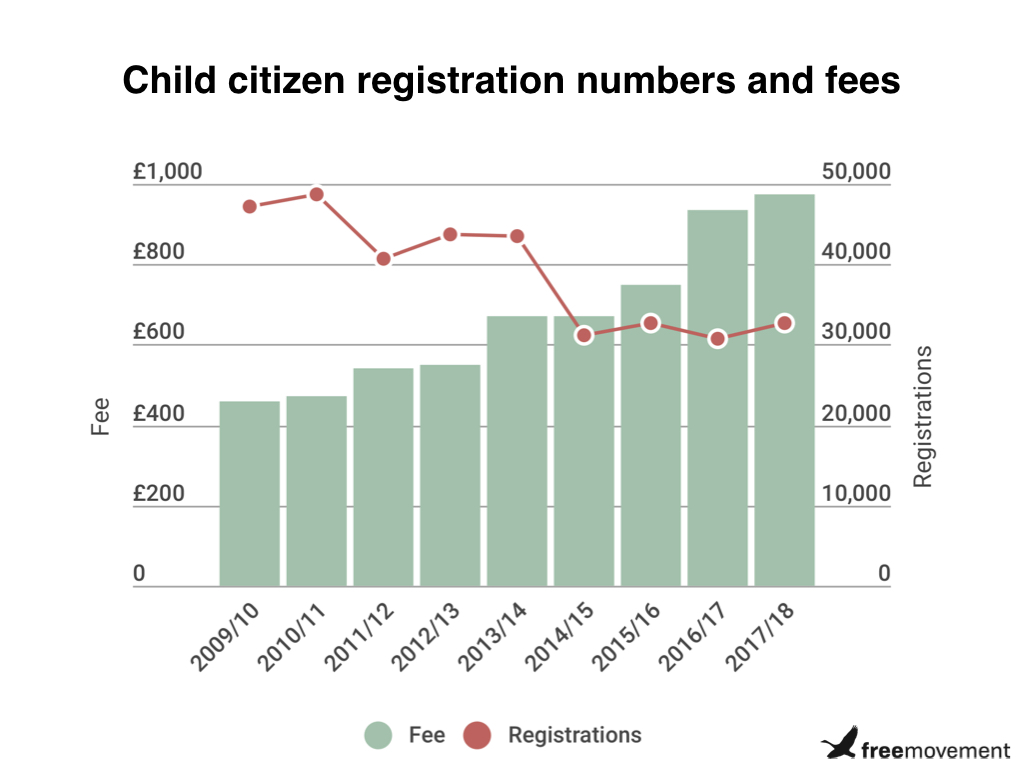- BY Colin Yeo

Home Office makes almost £100 million from children registering as British citizens
THANKS FOR READING
Older content is locked

A great deal of time and effort goes into producing the information on Free Movement, become a member of Free Movement to get unlimited access to all articles, and much, much more
TAKE FREE MOVEMENT FURTHER
By becoming a member of Free Movement, you not only support the hard-work that goes into maintaining the website, but get access to premium features;
- Single login for personal use
- FREE downloads of Free Movement ebooks
- Access to all Free Movement blog content
- Access to all our online training materials
- Access to our busy forums
- Downloadable CPD certificates
Home Office profit on the fees charged to children exercising their right to British citizenship comes to nearly £100 million over the past five years, Free Movement analysis has shown.
The controversially high fee for the citizenship process known as registration — set this year at £1,012 — is far higher than the estimated administrative cost to the department for processing registration applications. Last year, for example, the “profit” per application was £587. As 33,000 children successfully registered in 2017/18, that year the department raked in £19 million over and above the costs incurred.
From 2012/13 to 2017/18, the total was £94.24 million.
The Home Office acknowledged that our methodology is valid but said that the surplus revenue does not represent “profit”, as it helps pay for the immigration and borders system. The traditional rationale for taking a margin on immigration and nationality fees is that the system should be “funded by those who benefit from it”.
But campaigners against excessive fees point out that many have a legal right to citizenship that is triggered by registration. The Project for the Registration of Children as British Citizens has launched a legal challenge to the level of fees charged and says that “the Home Office is, in effect, seeking to sell something to children who are already entitled to it by Act of Parliament”.
With fees rising above inflation in most recent years, the number of children successfully registering has fallen. Cost is an obvious deterrent.

The calculation of the total surplus generated relies on departmental estimates for processing costs and does not take into account things like withdrawn applications or the time tag between application and registration, which might mean that the actual revenue generated is slightly different. Nor does it include the profit made on unsuccessful registration applications by children, which would take the total even higher.
British citizenship is the most secure immigration status possible but the right to registration under the British Nationality Act 1981 can lapse when a child turns 18. Children who would become British by registration but for the cost might have no other immigration status at all, even if born here to migrant parents, and risk being removed from the UK. Amnesty International UK says that children are being “priced out of their rights”.
When challenged on this issue at recent Prime Minister’s Questions recently, Theresa May suggested that citizenship is of little consequence for children:
A minor who has indefinite leave to remain will have access to benefits and entitlements which put them on an equal footing to their British citizen peers, so a grant of British citizenship is not therefore required.
We disagree. Some of the children applying for British citizenship will not have indefinite leave to remain. Those that do should be encouraged to become British citizens, not deterred by astronomical fees. It is a genuine scandal that the Home Office is making huge sums of money from children who are entitled to be British citizens and in doing so deterring some from claiming that entitlement.
With thanks to Conor James McKinney for his invaluable assistance with the research and number crunching for this piece. Thanks also to Solange Valdez-Symonds for her help with some of the legal issues on registration of children.
SHARE

